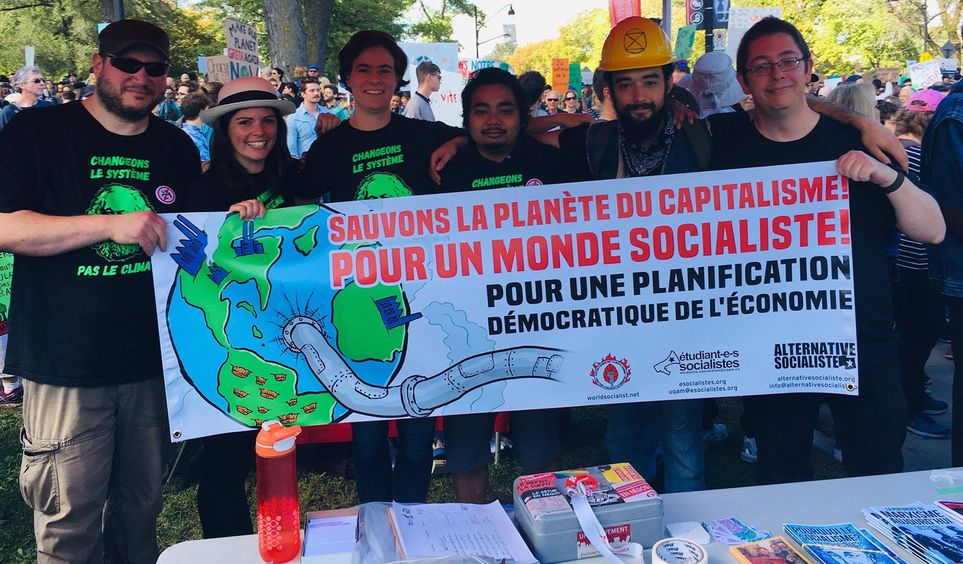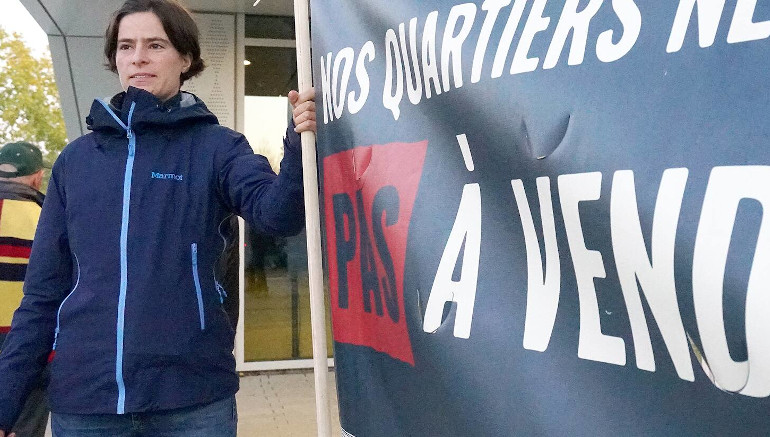World Depression
Canada and the world are in the worst economic depression in at least 90 years. At the start of 2020, the world was on the edge of a deep recession – COVID-19 plunged the economy over a precipice.
Canada is facing years of high unemployment and extremely low growth. Weak domestic and foreign demand, low commodity prices and high private-sector debt will all weigh on the economy. At the end of 2019, total debt was 294 percent of GDP with household debt at 101 percent and non-financial corporate debt at 114 percent.
Even with the easing of lockdown, official unemployment is nearly double that of a year ago. On top of those unemployed, many are working fewer hours than they want or are not actively seeking work. Overall, nearly one in four Canadians of the potential work force are “underutilized.” For young people it is even worse with nearly 25 percent unemployed and over one third “underutilized.” The federal government has pumped billions into the economy in corporate gifts and loans, wage subsidies and CERB, but these emergency funds will dry up eventually, many jobs will not return, and the loans and bills will have to be paid.
What will re-start the economy? There is a worldwide depression so export markets for resources and manufactured goods are weak. Consumers in Canada will spend less due to unemployment and fears about the future. Private companies will continue to refuse to invest, seeing few opportunities for profits.
Governments will have to act to provide employment and reconstruct society. The jobs program cannot simply be a return to the past of low wages, insecure jobs, weakened public services, discrimination and a polluted planet.
The jobs program Canada needs is a green jobs program. Rather than support polluting industries, we can repair the environment, make our cities better and provide jobs.
Proponents of oil and gas extraction argue that while the sector is responsible for 26 percent of Canada’s Greenhouse Gas (GHG) emissions, it made up 5.6 percent of Canada’s GDP and generated $2.13 billion in tax. The sector directly employed 162,748 in May 2020, down from 226,000, in a drop of 28% in 6 years, as the industry sheds jobs. Alberta tar sands needs oil to sell around $55 a barrel to break even; it has been below that for over two years. Hardly a jobs’ growth sector.
In addition to few jobs, the costs of oil and gas extraction include frequent spills and leaks into water systems, environmental devastation, contaminated water and earthquakes from fracking, and devastating consequences from potential coastal oil spills. The cost of climate change is already billions for fire fighting and damage, flood and storm damage and losses of food production.
There are far better ways to provide jobs and work for a healthy planet. For every $1 million of additional investment in a green economy ten times more jobs are created compared to in the oil and gas sector, according to the Canadian Centre for Policy Alternatives input-output models.
A socialist Green Jobs Program would include massive public investment in renewable energy, retrofitting and insulating homes and buildings, a full program of re-use and recycling, humane, safe and affordable food production, providing good public transit in cities, upgrading rail for freight and passengers across the country – all of which provide good jobs. Ending built-in obsolescence and waste and subsidies to polluting companies would greatly reduce pollution. The tar sands and nuclear power need to be phased out.
The workers in these industries should not pay for the cost of the transition. Instead, they should be guaranteed re-training and new good paying jobs in socially useful production. Statistics Canada recently reported that Canadian corporations held a staggering $353 billion in tax havens in 2018. Taking these funds into public ownership to fund all these changes would ensure that the rich and corporations, not working people, pay.
Climate Change – a Big Problem Requiring a Big Solution
The 20 warmest years on record occurred in the past 22 years, with 2020 continuing the trend. Record breaking temperatures and months of severe drought brought devastating bushfires ripping through Australia in 2019-2020, while this summer Siberia burned. Polar sea ice was at a record low in July 2020. In early August, Canada’s last intact ice shelf – the size of Manhattan – collapsed into the ocean. By 2050 rising oceans may have drowned cities including Miami, Mumbai, and Jakarta.
The 2018 UN Intergovernmental Panel on Climate Change (IPCC) report concluded that “limiting global warming to 1.5°C would require rapid, far-reaching and unprecedented changes in all aspects of society,” preferably “ensuring a more sustainable and equitable society.” The report stresses the need for a swift transition to achieve “net zero” carbon emissions by 2050 in order to avoid the worst effects of climate change.
Climate change is real, and yet we are faced with an infuriating degree of inaction by Canada’s leading politicians. Stephen Harper’s Tories famously muzzled climate scientists and approved every tar sands related project in sight, but Trudeau and the Liberals actually went ahead and bought the Trans Mountain Expansion (TMX) pipeline project for $4.5 billion! Maybe it should be called the Trudeau Memorial Expansion. The cost of this dramatic step away from the Paris Climate Agreement is now $12.6 billion and will only create 90 long term jobs! Just imagine what could be achieved by investing these tax-dollars into renewable energy. TMX is set to operate for 50 years – each year contributing emissions equivalent to driving 15 million cars. Hypocritically, Trudeau declared a climate emergency in 2019 and walked in Montreal’s climate march, while continuing over $3 billion a year government subsidies to the oil and gas industry. Since the start of the pandemic Trudeau has promised $1.7 billion to clean up orphan well sites – a direct subsidy to oil and gas producers, who have the legal responsibility of cleaning up after themselves.
The Liberals’ market-based solution, carbon taxes, do not work because they focus on individuals’ability to change their commuting behaviours, rather than target oil and gas companies’ profits. The difference they make is at the margin compared to the industrial sector, which produces 40 percent of Canada’s CO₂ emissions and is exempt from the tax.
Fighting climate change is a question of political will. The gap between the scale of the climate crisis and the unwillingness to address it with real, big solutions is the driving force behind young people taking to the streets in Canada and around the world demanding action on climate change. We have to keep fossil fuels in the ground, but what political force is up to the task?
NDP and the Greens’ Environment Inconsistency
In government, the New Democratic Party has been indecisive on the environment. Alberta’s former NDP Premier Rachel Notley (2015-2019) implemented energy efficiency and renewable energy strategies including a plan to have 30% renewable electricity and to phase out coal by 2030. Yet, the Alberta NDP ended up as prisoners of Alberta’s oil and gas sector, failing to diversify the economy despite 86% popular support for such a move. Amid low oil prices they peddled the myth that building pipelines, like TMX, would increase the demand for Alberta’s bitumen and its price, thus creating jobs. But the tar sands continues to shed jobs due to increased automation and falling prices.
BC’s NDP government opposed the TMX, but mainly in words and the courts. It went ahead with building the problematic Site-C dam, now heading for Muskrat Falls level of cost overruns. It continues the BC Liberals’ tax cuts/subsidies to the oil and gas sector and approval of the $40 billion dollar LNG project, including a $6 billion tax break for LNG Canada. According to the Pembina Institute, the LNG plans would “emit enough carbon pollution to make meeting B.C.’s 2050 climate target virtually impossible.”
In November 2019, the BC NDP passed the United Nations Declaration on the Rights of Indigenous Peoples (UNDRIP), but its support of the Coastal GasLink LNG Canada pipeline culminated in the militarized RCMP invasion of Wet’suwet’en territory in early 2020.
Juggling the inconsistent climate policies of provincial NDP governments, the federal NDP is equally wobbly and vague on environmental issues. Jagmeet Singh’s 2019 election policies included ending the annual $3 billion subsidies to oil and gas companies, expanding public transit and creating 300,000 good jobs as part of a just transition. Singh opposed the TMX, citing an unsatisfactory approval process, but the NDP is vague on whether it would support other pipeline or fracking projects.
The Canadian Union of Postal Workers has made bold proposals to transform Canada Post into a social and ecological trail blazer. Delivering Community Power should be solidly supported by the NDP and other unions.
In 2016 the NDP missed an opportunity to endorse and campaign for the Leap Manifesto: implementing UNDRIP, 100% renewable energy in two decades, community control of energy systems, retrofits, expanded transit, retraining for oil and gas workers, anti-austerity, taxing the rich, cutting military spending and expanded democracy. Unfortunately, the NDP only discussed this Keynesian manifesto, taking no action.
The Green’s Mission: Possible was the boldest climate platform in the 2019 election. Aiming to engage all levels of society and place Canada on war footing to combat climate change it included: no new oil and gas infrastructure, no more subsidies, ban fracking, investment in electric vehicles and rail, nation-wide building retrofits, and carbon pricing. Controversially, the plan called for a ban on oil and gas imports, temporarily guaranteeing jobs in Alberta, but also committing Canada to especially polluting bitumen extraction until 2050.
Yet, in office, the Greens are not consistently bold on climate issues. In BC, where the Greens are propping up the NDP government, they quietly agreed to the Site-C dam and a fracking expansion but opposed the NDP’s $6 billion LNG Canada tax break. In PEI, the Greens won eight seats in 2019 despite campaigning on weak environmental policies – reinforcing the carbon tax, loans and incentives for electric cars and solar panels.
The Need for a campaigning party for people and environment
Uniting all who want to stop the looming disaster requires a consistent, clear, bold set of demands. But it also requires a clear understanding of how major progressive change is won: an organised mass movement centred on the social and economic power of the working class.
The NDP and the Greens share a myopic, electoralist approach to politics that does not build movements to popularize and win their platforms between elections. The NDP generally panders to the political centre, already occupied by the Liberals, and does not mobilize its members to sink deeper roots into communities and win even its timid program. The NDP is also reluctant to tax the rich, making it hard for it to implement popular demands like $10/day childcare, well-funded services and a green economy. Thus, the NDP frequently grabs defeat out of the jaws of victory in election campaigns and federally it has dropped from 103 seats in 2011 to 24 seats in 2019. Singh’s leadership has breathed some life into the party, but his centrist, non-campaigning approach means the NDP continues to stagnate in the polls.
The Greens also fail to build movements between elections. As “green capitalists,” the Greens have almost nothing to offer working-class people compared to even the NDP, undercutting the popular support needed for their bold environmental program. Former BC Green Party leader Andrew Weaver blocked card-check, which would have made it easier for workers to unionize, vowing “[it] is never going to happen.” In PEI, the Green’s housing platform was a gift to developers and their position on minimum wage the same as the Liberals. In Vancouver, three Green city councillors refuse to form a progressive majority to bring in rent control and build social housing, sometimes voting with the right-wing.
It is unclear whether the NDP and the Greens just see movements as ineffective or whether they fear mobilizing movements that will outgrow their parties. Clearly, fighting climate change is not just a question of program but also of method.
The Case for a Publicly Owned, Planned Economy
Both the NDP and the Greens correctly call on taxing the rich, cracking down on tax havens, and increasing corporate taxes (Greens propose an increase from 15 to 21 precent; the NDP 15 to 18 percent) to pay for their platforms. The Greens also wish to tax commercial bank profits at 5 percent.
But the rich won’t leap at the opportunity to be taxed billions of dollars. Canada’s big five banks made $45 billion net profit in 2019 amidst a world full of inequality; they aren’t looking to share. Oil and gas corporations have vested objective interests in refusing any kind of industry phase out. The Greens have an appropriately bold plan to put Canada on World War II scale economic mobilisation and government planning, but capitalists will never allow this. At worst they would freeze investment and cripple the sector rather than give up their profit margins. At best they would use their billions to lobby for the slowest, market-driven, transition possible.
In the immediate emergency of the COVID pandemic, the federal government suddenly found tons of money to help. The same and more is needed to provide good jobs and a healthy climate. But the Liberals were unwilling to order companies to even produce masks, leaving it to the mysteries of the market. During World War II, the capitalist class was forced to give up control of their industries, but only because war-time super profits flowed into their pockets. If we want a swift and just transition that can avert climate catastrophe, we cannot bribe the capitalists.
A mass movement can win some bold environmental demands but truly transitioning to a sustainable economy rooted in renewable resources requires the public ownership of the top energy companies to ensure conversion to clean energy and protect jobs through retraining. Doing the same in key construction and manufacturing sectors could fast-track a complete infrastructure overhaul. To coordinate this transition, democratic planning and management is necessary to ensure protection of the environment, eco-systems and biodiversity and ensuring the transition is socially just so poor and working people do not pay for this environmental jobs program.
What we need
We need a different type of party. The massive 2019 youth climate marches are signs that people are deeply concerned about the impending climate disaster but also determined to do something about it. These marches were very inspiring, but it will take an organised movement to take the next steps forward.
Canada needs a party that has a bold climate platform, a democratic structure and that runs campaigns continuously in communities and workplaces, not just for elections. Such a party would stand in solidarity with people in struggle, tax the rich, invest in public services including housing, and its environmental program would include the necessary public ownership and democratic planning needed for a swift transition that places people’s needs and the environment above private profits.
Democratic plan, not private profit
Socialist Change, not climate change



